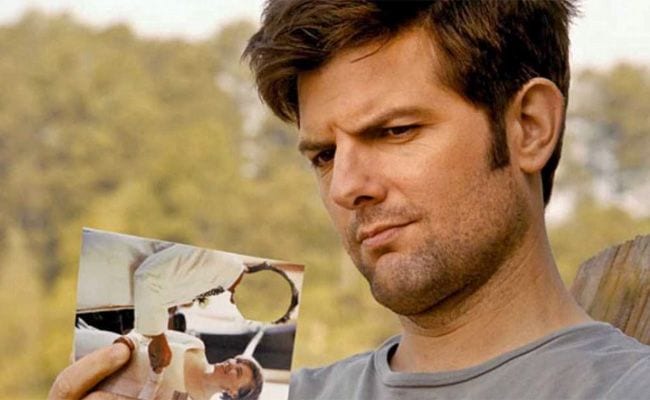
Hugh (Richard Jenkins) and Melissa (Catherine O’Hara) have the kind of marriage where divorce can’t help but seem like a relief to everyone involved, even maybe their children. But they also have the kind of marriage that can’t end with a mere amicable parting of ways, which puts Carter (Adam Scott) in a delicate position between the two of them for, if not the rest of his life, at least several decades.
As a child, Carter is the subject of a book on children of divorce by non-doctor, non-therapist Dr. Judith (Jane Lynch); he discovers this as an adult, around the time that his little brother Trey (Clark Duke) announces his upcoming wedding, which necessitates the involvement of both parents. They remain contentious despite the fact that they’ve both remarried: Melissa to Gary (Ken Howard) and Hugh to the much-younger Sondra (Amy Poehler). Also, Carter has a long-time girlfriend (Mary Elizabeth Winstead) and for no other reason than to provide a hint of romantic rivalry, winds up meeting a fellow divorce-book subject (Jessica Alba).
That is all to say that A.C.O.D. (the title stands for “adult children of divorce”), now on Blu-ray, is a movie with a lot of characters, and a lot of talent on hand to embody those characters. Probably too many and too much, respectively. Divorce is a vast and fruitful topic for a comedy — so vast that A.C.O.D. feels compelled to present, comment upon, and/or rekindle all manner of underdeveloped relationships. At the same time, Carter’s skittishness and flailing has the specificity of a neurotic overreaction.
Instead of bridging the personal and the universal, the film overloads itself with thematic business. First it’s about neuroses caused by a messy divorce, then about adult children managing and babysitting their parents, then it’s a sort-of clever riff on the childhood fantasy that divorced parents will reunite, until these concerns pile up and the film and reveals itself as a fake-problem comedy. A fake-problem comedy is any comedy based centrally on thin, waffly conceits like commitment issues, or mild family conflicts, or secrets that don’t actually need keeping (like Carter’s shame over being the subject of Judith’s book); comedies, in other words, that can’t build funny situations because they’re basically about a person dithering over an internal conflict that would make more sense for an intimate indie drama (and even there, would probably try a lot of people’s patience).
Of course, any of this material, even internal dithering, could be funny in the right hands. But as talented as this cast is, they don’t really gel as an ensemble. Some of director Stuart Zicherman’s physical staging is awkward, neither heightened like farce nor grounded enough for realism (the scene that introduces Carter’s girlfriend, in particular, is weirdly disorienting), and the screenplay, co-written by Zicherman and Daily Show/Modern Family scribe Ben Karlin, gets too tangled in its subplots to zing. It’s not an outright disaster; pros like Scott and Lynch can spin okay lines into some laughs, while Jenkins and O’Hara capture the hostility disguised as reasonable behavior that sometimes characterizes volatile exes. But the actors can’t spin the whole movie.
A.C.O.D.‘s comedian round-up may feel more mish-mashy than it should because most of it feels cribbed from more observant and anarchic comic filmmakers like Adam McKay (who gave Scott and Jenkins great roles in Step Brothers) and Judd Apatow (who gave Jane Lynch one of her best big-screen parts), with associated performers like Poehler and Duke there to fill things out. It’s easy to imagine the cast falling into the film like dominos, Scott and Poehler eager to work together again, Scott bringing in Jenkins, Duke happy to cross over to other NBC comedy people, Alba eager to show off her funny side, everyone excited to meet Catherine O’Hara. The result, though, is absolutely nobody’s best comedy (not even Alba’s).
The Blu-ray’s extras serve as pallid reminders of other, better comedies, too. Perhaps remembering that McKay and Apatow movies often feature reels of multiple takes and improvisations, the A.C.O.D. disc gives one to Poehler… only it’s a minute long, derived from a single moment in the film, and contains no great or even particularly good material (especially odd given Poehler’s ace improvisational skills). A series of fake PSAs from Scott and Duke about children of divorce, made to promote the film, fares better, but doesn’t offer more than some passing chuckles. That’s A.C.O.D. all over: at its best, it’s forgettable; at its worst, you remember all of the wasted potential.


![Call for Papers: All Things Reconsidered [MUSIC] May-August 2024](https://www.popmatters.com/wp-content/uploads/2024/04/all-things-reconsidered-call-music-may-2024-720x380.jpg)



